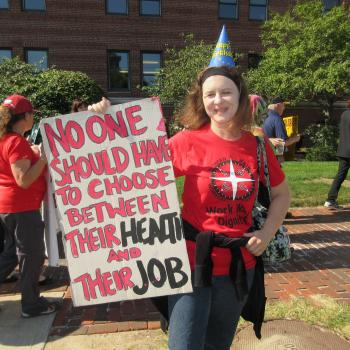Tony Judt has written a compelling little book, his final one. The title comes from Oliver Goldsmith: “Ill fares the land, to hastening ills a prey; where wealth accumulates, and men decay“. It is a beautiful and poignant title for a beautiful and poignant book. A short read, it is basically the length of a long essay and is written with a sense of passion and urgency. As well it should be, for it is Judt’s swan song. Judt died recently from Lou Gehrig’s disease.
Ill Fares the Land is a cry for the left to reclaim the moral legacy of social democracy. It begins as follows:
“Something is profoundly wrong with the way we live today. For thirty years we have made a virtue out of the pursuit of material self-interest: indeed, this very pursuit now constitutes whatever remains of our sense of collective purpose. We know what things cost but have no idea what they are worth. We no longer ask of a judicial ruling of a legislative act: is it good? is it fair? is it just? Will it help bring about a better society or a better world? These used to be the political questions, even if they invited no easy answers. We must learn once again to pose them.
The materialistic and selfish quality of contemporary life is no inherent in the human condition. Much of what appears ‘natural’ today dates from the 1980s: the obsession with wealth creation, the cult of privizatization and the private sector, the growing disparities of rich and poor. And above all the rhetoric which accompanies these: uncritical admiration for unfettered markets, disdain for the public sector, the delusion of endless growth.
We cannot go on living this like”.
With this powerful introduction, Judt documents the pathologies of modern society, most of which can be traced to rising inequality – reduced social mobility, economic insecurity, fraying trust among people, ill-health, alcoholism and drug addiction, crime, mental illness. Inequality, he claims, is not just unattractive in itself, it corresponds to pathological social problems that cannot be addressed without turning to their underlying cause.
It wasn’t always that way. In fact, postwar social democrats were a victim of their own success. Alongside the Christian Democrats, they adopted the “third way” of the social market to make sure that the pathologies of the first half of the twentieth century – economic chaos, political extremism, a collapse it democracy, war – did not return. It succeeded beyond their wildest dreams, and the decades following the second world war marked some of the most prosperous and stable in history, on both sides of the Atlantic.
The first nagging problems arose in the 1960s, when the first secure generation rebelled against the world created by its parents, with its cozy secure sense of benign paternalism. This generation took a fundamentally wrong turn. As Judt puts it, the “New Left” rejected the inherited collectivism of its predecessor. Instead, individualism was the cause of the hour – as Judt puts it, “the assertion of very person’s claim to maximized private freedom and unrestrained freedom to express autonomous desires and have them respected and institutionalized by society at large”. Instead of the common good, what mattered was “identity”. In this, Judt’s analysis is perfectly aligned with Pope Benedict’s – which might surprise a secular Jewish leftist like Judt – in that this paves the path toward moral relativism. And even as this generation adopted some noble causes, such as ending the Vietnam war, there was no sense of collective purpose, merely a political extension of individual self-expression.
You can probably see what comes next. Judt makes the argument I have made many times – the individualism of the 1960s paved the way for the individualism of the 1980s. After its complete failure in the 1930s and repudiation after the war, the idea of the unfettered free market was back in vogue, because it furthered the cause of individual self-interest, that great legacy of the 1960s. Judt devotes some time to describing the Austrian roots of this economic theory, showing that Hayek and his acolytes were tormented by the totalitarian experience in their native country, something they mistakenly assumed was due to a diminution in economic freedom. Indeed, Hayek warned ominously that the European welfare states would lead to dictatorship. He could not have been more wrong, an inconvenient fact ignored by his modern fans.
Here is where Judt’s reading might be overly narrow. I think he exaggerates the influence of the Austrian school, which I have always regarded as fringe and quirky. Instead, what slipped out of the box was the individualism of the Enlightenment, which goes all the way back to the nominalist revolution against the Catholic intellectual order. But I would not expect Judt to be overly familiar with the (Christian) theological underpinnings of modernity! A child of the Enlightenment himself, he argues that the moral thinkers of the time would never have countenanced the modern situation where the essential virtue of prudence has been lost.
Judt notes that social democrats have lost their sense of purpose after the tumultuous 1960s and the rise of the self-confident free-market right. He also believes they learned the wrong lessons from the fall of communism, which did not herald the end of history and the glorious reign of free markets. Social democrats have been apologizing for their core beliefs, and instead of the political giants of previous generations, the modern political sphere is populated by empty suits who are more comfortable with sound bites than moral purpose. As Judt puts it, “it is the gap between the inherently ethical nature of public decision-making and the utilitarian quality of contemporary political debate that accounts for the lack of trust felt towards politics and politicians”. He cites the example of Pope John Paul’s popularity to argue that “humans need a language in which to express their moral instincts”. And we have lost that moral language. Again echoing Pope Benedict – and again, probably without realizing it – Judt argues that:
“Even if we concede that there is no higher purpose to life, we need to ascribe meaning to our actions in a way that transcends them. Merely asserting that something is or is not in our material interest will not satisfy most of us most of the time. To convince others that something is right or wrong we need a language of ends, not means. We don’t have to believe that our objectives are poised to succeed. But we do need to be able to believe in them”.
Judt goes on:
“We are all children of the Greeks. We intuitively grasp the need for a sense of moral direction..Natural Aristotelians, we assume that a just society is one in which justice is habitually practiced; a good society one in which people behave well. For Aristotle and his successors, the substance of justice or goodness was as much a function of convention as of definition..The attractions of a ‘reasonable’ level of wealth, an ‘acceptable’ compromise, a just or good resolution was self-evident. The avoidance of extremes was a moral virtue in its own right, as well as a condition of political stability. However, the idea of moderation – so familiar to generations of moralists – is difficult to articulate today. Big is not always better, more is not always desirable; but we are discouraged from expressing the thought.
One source of our confusion may be a blurring of the distinction between law and justice. In the US especially, so long as a practice is not illegal we find it hard to define its shortcomings. The notion of ‘prudence’ eludes us: the idea that it is imprudent for Goldman Sachs to distribute billions of dollars in bonuses less than a year after benefitting from taxpayer largesse would have been self-evident to men of the Scottish Enlightenment, just as it would to the classical philosophers. ‘Imprudence’ in this respect would have been as reprehensible as financial chicanery: not least for the risks to which it exposed the community at large”.
To sum it up, Judt argues that we need a moral narrative, “an internally coherent account that ascribes purpose to our actions in a way that transcends them”.
But what do we want? Judt argues, quite correctly in my view, that the reduction in inequality must come first – with stark inequality, other goals become difficult if not impossible to achieve. For Judt, inequality is the overarching moral issue as it causes and reflects the loss of social cohesion that is so evident today. With inequality, we lose all sense of solidarity. We lose the sense of common purpose and mutual dependence that is the linchpin of community. Ominously, without trust or social cohesion, stability and even democracy are at risk. Judt does not think we will re-make the mistakes of the 1930s, which followed another period of dizzying globalization, boundless optimism, staggering inequality, and free market fundamentalism. It is more likely, he thinks, that we will make big mistakes all on our own.
But we must re-learn certain lessons. We must remember why the social market was put in place at that particular point in history. Now more than ever, when conditions eerily mirror the pre-war period in so many different dimensions, we need to discover anew the role of the state – the properly-defined role, of course. The state cannot do everything, but neither should we think it can do nothing. And so Judt argues that “the first task is to remind ourselves of the achievements of the 20th century, along with the consequences of a heedless rush to dismantle them..as the British political theorist John Dunn has wisely observed, the past is somewhat better lit than the future: we can see it more clearly”.
There is something inherently conservative about all of this. For, as Judt notes, “the left has something to conserve”. Indeed, much of the rise of social democracy was less about building a brave new world, and more about restoring the moral rules to economic life that were trampled underfoot by industrial capitalism. Indeed, it is the political right that has insisted that change is good over the past half century. Social democracy was once associated with prudence, and should be again. Social democrats should apologize less for their shortcomings and speak more assertively of their achievements. We should be angrier that the right has spent three decades trying to unravel and overthrow these achievements:
“It ought to worry us, if only on prudential grounds: why have we been in such a hurry to tear down the dikes laboriously set in place by out predecessors? Are we so sure that there are no floods to come? To abandon the labors of a century is to betray those who came before as well as generations yet to come.. Social democracy does not represent an ideal future; it does not even represent the ideal past. But among options available, it is better than anything else to hand”.
Judt quotes the famous Edmund Burke statement that society is “a partnership not only between those who are living, but between those who are living, those who are dead, and those who are to be born”. Judt argues that the left must take this on board, jettisoning the 1960s baggage, and realizing once more that we are connected to both past and future.
In conclusion, Judt notes that “we are intuitively familiar with issues of injustice, unfairness, inequality, and immorality – we have just forgotten how to talk about them”. Instead, we have had “two lost decades, during which fantasies of prosperity and limitless personal advancement displaced all talk of..social justice or collective action”. It is time to rediscover the lost path and walk it anew. This is fundamentally a conservative project, a moral project, and (even if it comes from a secular Jew), a Catholic project. Let us respond to Judt’s call.
Tony Judt, R.I.P.
















